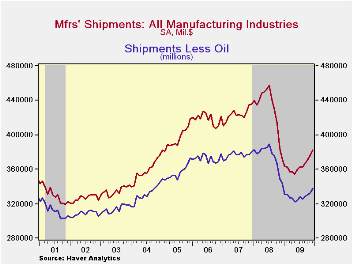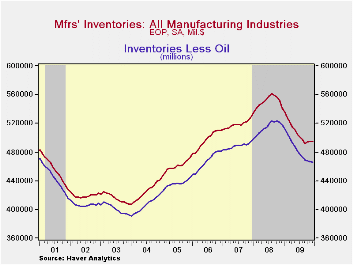 Global| Feb 04 2010
Global| Feb 04 2010U.S. Factory Shipments Surge And Trim Inventories Slightly
by:Tom Moeller
|in:Economy in Brief
Summary
actory shipments surged for the fourth straight month during December. The 1.9% increase followed an upwardly revised 1.6% November gain and it was the fourth straight month of strong increase. Shipments of nondurables were strong all [...]
 actory
shipments surged for the fourth straight month during December. The
1.9% increase followed an upwardly revised 1.6% November gain
and it was the fourth straight month of strong increase. Shipments of
nondurables were strong all during 2009 (9.3% y/y) due to the rise in
oil prices. Excluding oil, factory shipments rose 0.9% y/y, still an
improvement from the 11.9% y/y decline as of July. Shipments
of electrical equipment (-8.4% y/y) were strong for the third
consecutive month. Machinery shipments jumped 5.1% (-16.1% y/y) and
have risen sharply in three of the last four periods. Primary metals
shipments (+2.2% y/y) increased notably during 2H '09 and furniture
shipments (-10.0% y/y) have risen for three months.
actory
shipments surged for the fourth straight month during December. The
1.9% increase followed an upwardly revised 1.6% November gain
and it was the fourth straight month of strong increase. Shipments of
nondurables were strong all during 2009 (9.3% y/y) due to the rise in
oil prices. Excluding oil, factory shipments rose 0.9% y/y, still an
improvement from the 11.9% y/y decline as of July. Shipments
of electrical equipment (-8.4% y/y) were strong for the third
consecutive month. Machinery shipments jumped 5.1% (-16.1% y/y) and
have risen sharply in three of the last four periods. Primary metals
shipments (+2.2% y/y) increased notably during 2H '09 and furniture
shipments (-10.0% y/y) have risen for three months.
Though factory
inventories slipped 0.1% in December that followed much larger declines
extending back to September of 2008. The latest monthly drop came
despite a 3.9% jump (-22.1% y/y) in auto inventories which was the
 third
consecutive strong monthly gain. Elsewhere, petroleum inventories
jumped 4.2% (25.8% y/y) due to higher prices. Excluding oil, factory
inventories slipped 0.3% (-10.2% y/y). Machinery inventories slipped
(-13.4% y/y) but that compares to large declines which extend through
most of last year. Electrical equipment inventories slipped 0.5%
(-17.7% y/y) but the monthly rates of decline also have
slowed considerably. Inventories of computers & electronic
products rose 0.7% (-9.5% y/y) for the first monthly gain in twelve
months.
third
consecutive strong monthly gain. Elsewhere, petroleum inventories
jumped 4.2% (25.8% y/y) due to higher prices. Excluding oil, factory
inventories slipped 0.3% (-10.2% y/y). Machinery inventories slipped
(-13.4% y/y) but that compares to large declines which extend through
most of last year. Electrical equipment inventories slipped 0.5%
(-17.7% y/y) but the monthly rates of decline also have
slowed considerably. Inventories of computers & electronic
products rose 0.7% (-9.5% y/y) for the first monthly gain in twelve
months.
Factory orders rose 1.0% for the second consecutive month but that rise also was lifted by higher oil prices. Less oil (where orders equal shipments), orders rose 0.7% (-1.0% y/y) and have risen for four consecutive months. Orders for primary metals have been notably strong (16.9% y/y) as have machinery orders where the 0.1% y/y decline compares to one-third drops early in 2008.The decline in electrical equipment orders has moderated to 7.4% from -30.3% as of June.
The Manufacturers' Shipments, Inventories and Orders (MSIO) data are available in Haver's USECON database.
| Factory Survey (NAICS, %) | December | November | October | Y/Y | 2009 | 2008 | 2007 |
|---|---|---|---|---|---|---|---|
| Inventories | -0.1 | 0.2 | 0.4 | -8.6 | -8.6 | 2.2 | 3.7 |
| Excluding Transportation | -0.0 | 0.3 | 0.3 | -9.2 | -9.2 | -0.5 | 2.7 |
| New Orders | 1.0 | 1.0 | 0.8 | 3.6 | -17.2 | 0.0 | 1.9 |
| Excluding Transportation | 1.2 | 2.1 | 0.7 | 5.8 | -15.8 | 3.0 | 1.2 |
| Shipments | 1.9 | 1.6 | 0.9 | 2.6 | -15.2 | 1.6 | 1.2 |
| Excluding Transportation | 1.6 | 1.7 | 1.6 | 3.1 | -15.3 | 3.5 | 1.5 |
| Unfilled Orders | -1.0 | -0.7 | -0.6 | -10.3 | -10.3 | 3.4 | 17.1 |
| Excluding Transportation | 0.2 | 0.2 | -0.1 | -8.6 | -8.6 | -1.4 | 8.2 |
Tom Moeller
AuthorMore in Author Profile »Prior to joining Haver Analytics in 2000, Mr. Moeller worked as the Economist at Chancellor Capital Management from 1985 to 1999. There, he developed comprehensive economic forecasts and interpreted economic data for equity and fixed income portfolio managers. Also at Chancellor, Mr. Moeller worked as an equity analyst and was responsible for researching and rating companies in the economically sensitive automobile and housing industries for investment in Chancellor’s equity portfolio. Prior to joining Chancellor, Mr. Moeller was an Economist at Citibank from 1979 to 1984. He also analyzed pricing behavior in the metals industry for the Council on Wage and Price Stability in Washington, D.C. In 1999, Mr. Moeller received the award for most accurate forecast from the Forecasters' Club of New York. From 1990 to 1992 he was President of the New York Association for Business Economists. Mr. Moeller earned an M.B.A. in Finance from Fordham University, where he graduated in 1987. He holds a Bachelor of Arts in Economics from George Washington University.






